
Postdocs of EMBL
Continuing our Humans of EMBL series, we turn the spotlight on the diverse universe of EMBL’s 200-strong postdoc community
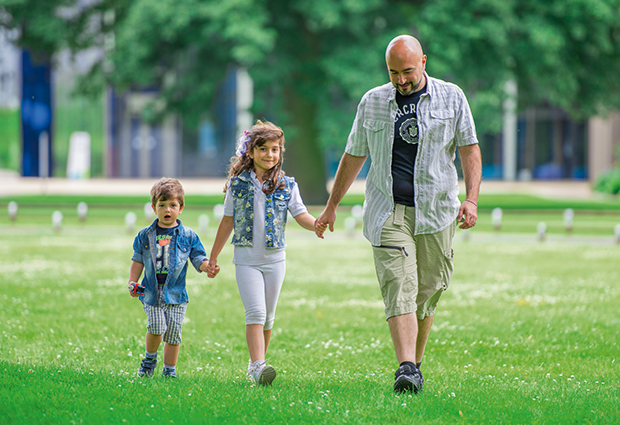
By Adam Gristwood and Rosemary Wilson
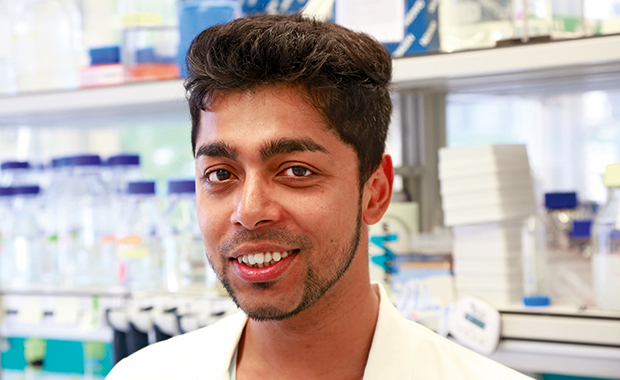
Tuhin Bhowmick
EMBL Interdisciplinary Postdoc, Meijers & Peri groups
“For me, science is a way of life. I grew up in a family of doctors and was very used to hearing scientific discussions at the dinner table. My mum encouraged my interest by giving me books to read like 100 Important Discoveries. But I actually thought I would be a detective! In my mother tongue ‘detective’ translates as ‘the one who is searching for the truth’, and in effect that is what we do as scientists. Every day we follow the principles observe, analyse, understand. There is a powerful expression: ‘to understand is to transform what is!’ and the people who inspire me most are not only great scientists, but those who also manage to bring their science to people. There is no rule that all science has to have an application, but if there is scope to do so I think it’s our responsibility to facilitate that.
Entrepreneurship really complements my academic work here in Hamburg
“A few years ago, a friend and I set up a biotechnology company: by understanding how proteins are built, we wanted to see if it was possible to build a collection of ‘molecular Lego bricks’ and design a smart, functional material. In the beginning this was basic scientific exploration, but then we wondered if it was feasible to use our method as ‘ink’ for 3D printing of human tissues. Indeed it was, and using living cells we printed part of a functional liver. The great hope is that this research could one day lead to alternatives for full-scale liver transplants. There is still a lot to figure out, but it’s been an exciting journey so far. Entrepreneurship really complements my academic work here in Hamburg and in the end – even if things don’t work out – it has been an enjoyable and fulfilling journey!”
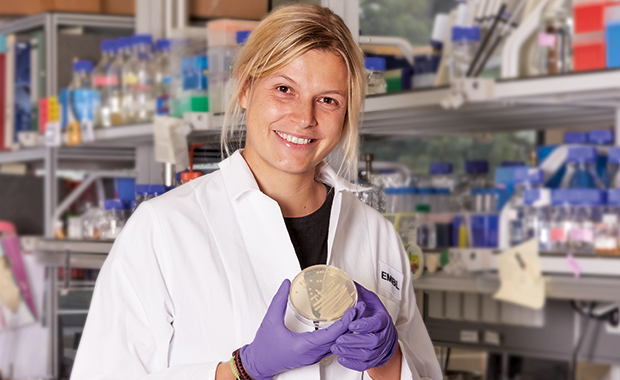
Sibylle Vonesch
Postdoc, Steinmetz group
We are encouraged to mingle and take part in activities with other people
“In the unusual setting of a brewery, I was tasked with introducing yeast’s other face to participants of the Friends of EMBL Frühschoppen – a traditional Sunday morning social gathering. Rather than using yeast to make beer or bread, I study the effects of genetic variation and how this propagates across multiple molecular levels to affect the cell. By understanding the basic principles of variation in this very simple organism, it is possible to also gain insights into human biology, health and disease. I was involved in planning the event at a very early stage and it forced me to think about my project in a completely different way – participants were thirsty to learn more! What I really like about being a postdoc at EMBL is the level of interactivity: we are encouraged to mingle and take part in activities with other people. This is good for the science because you learn about the activities of other groups and how that can be relevant to your research. “
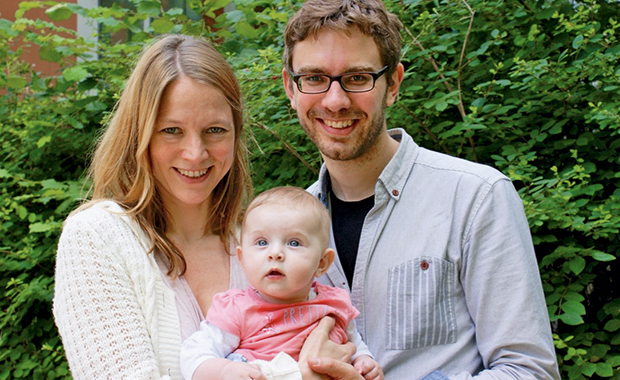
Jan Strauss
EMBL Interdisciplinary Postdoc, Löw and Thornton groups
One of the biggest challenges is striking the right balance between work and family.
“My daughter is six months old now. After her birth it was difficult because my girlfriend was very ill and I took time off work to look after them both. Luckily, things got better and have settled down now and we have a daily routine going – as much as possible! One of the biggest challenges is striking the right balance between work and family. I feel a lot more focused at work, trying to plan ahead and be more organised to make sure I finish on time and can get back home to spend time with my family. You also have to switch your subject quickly – from changing dirty nappies to pipetting in the wet lab – after a rough night that can really be quite a challenge! Being busy at work and busy at home, I’ve evolved into an early bird, getting up to have some quiet time for myself before everyone else gets up. Having a child has also changed my outlook on life. I think, and worry, more about the future. Priorities change, and when things don’t go so well at work, having a family at home puts things into perspective. Yet despite the challenges and sleepless nights, it’s very fulfilling! “
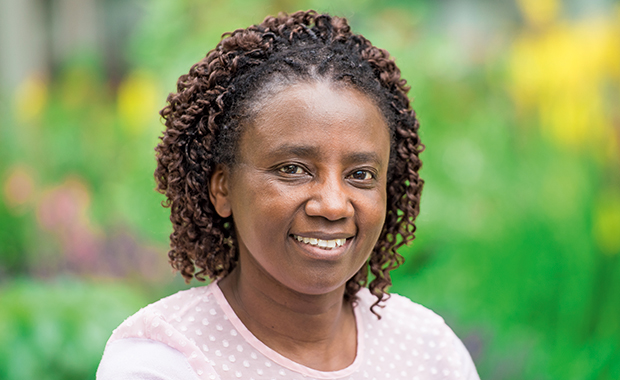
Grace Mugumbate
EMBL Interdisciplinary Postdoc (until April 2016); now a research scientist and data curator at EMBL-EBI
“I always had an inquisitive mind and was fascinated by chemistry, wanting to know the answers to questions such as: what is matter? What is an atom? What is a protein? And what is the role of chemistry in the life sciences? As a high school student in Zimbabwe, where very few girls joined science classes, a question of a very different nature got in the way: I am a woman – how can I be good in science and inspire other women? An inspiring teacher and mentors shone a light on opportunities for me to become one. I managed to see past the male-scientist stereotype and proceeded to do a PhD in Chemistry, in Cape Town, South Africa.
I am a woman – how can I be good in science and inspire other women?
Through collaborations and the desire to participate in interdisciplinary research in an international atmosphere a door was opened for me at EMBL-EBI. Here, I have the freedom to satisfy my curiosity in drug discovery and life sciences, working on target identification and validation of anti-tuberculosis compounds, aiming to help tackle a killer disease that affects millions worldwide. Having support from the EMBL community, opportunities to work with renowned scientists like John Overington, participating at local and international conferences and establishing collaborations helped me to excel. The exposure, the experiences and the inspiration from female leaders such as Janet Thornton, former EMBL-EBI director, continue to shine the light on massive opportunities. Indeed, there are no limits, no boundaries and our potential is limitless – it is all about how you see yourself.
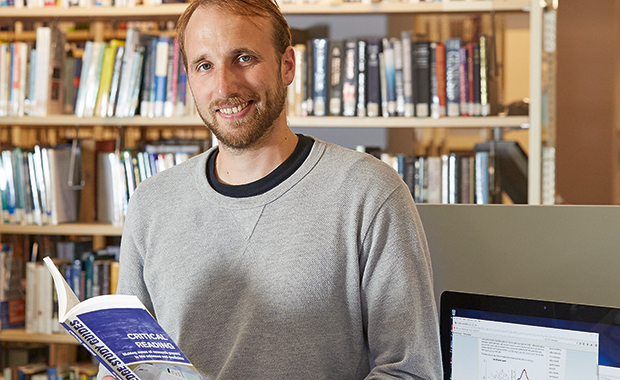
Falk Hildebrand
Postdoc, Bork group
In some respects everyone is a ‘mutant’ because we all carry mutations in our genes
“I recently gave a talk at an EMBL Science Movie Night, themed ‘the truth about X-men’. In the film, X-men are feared and hated by humans because they are different: heroic mutants, each born with special powers. Of course people realise that X-men is not reality, but giving a talk with the movie gave me a chance to present to a large public audience what mutants are away from the world of Hollywood. We are all a little bit different and in some respects everyone is a ‘mutant’ because we all carry mutations in our genes – it is very normal to have mutants sitting next to you! My key message mirrored that of the film: don’t be afraid if something or someone looks different, it’s just a natural part of life.”
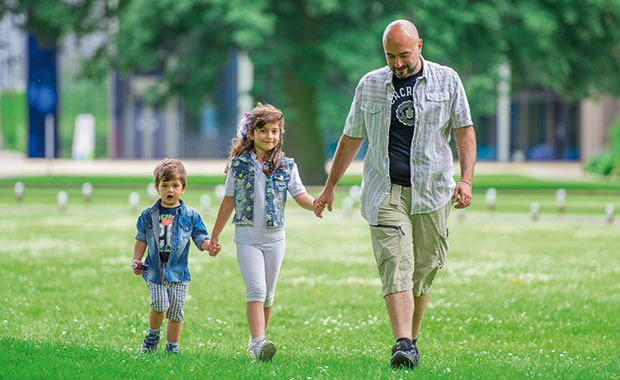
Francesco Iorio
EMBL-EBI/Sanger Interdisciplinary Postdoc (until April 2016); now a senior bioinformatician at EMBL-EBI
I want to be a great dad, as well as a great researcher
“When I was nine years old my parents gave me a Commodore 64. This computer ran on cassettes and I wrote my first lines of code with it: a simple animation of a centipede. I was amazed because I realised it was possible to be very creative with computers. What people appreciate the most about me is my creativity, and while I am interested in literature, art and – naturally as an Italian – singing, my career as a computer scientist has enabled me to be involved in creative collaborations with people in many different fields. EMBL is a great place because it nurtures creativity: I have had the opportunity to be free, independent and tackle problems with a lateral-thinking approach. It is also very family friendly. This is my first experience living abroad, and I came here to EMBL-EBI together with my family. There is a lot of support, an onsite nursery and I have even brought my kids into the office on occasions – they have been very welcome! This is important to me as I want to be a great dad, as well as a great researcher.”
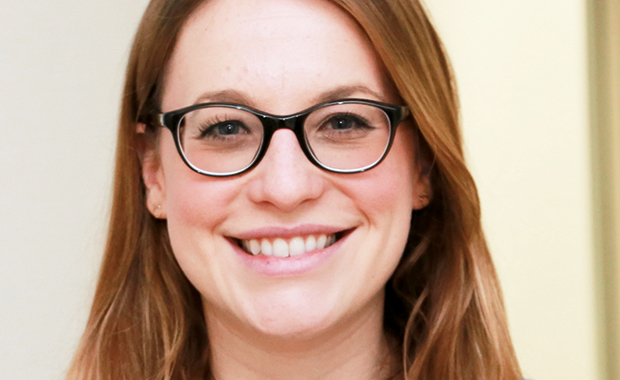
Kate Beckham
EMBL Interdisciplinary Postdoc, Wilmanns and Sachse groups
“One of the things I love most about science is connecting with many different people. I’ve been on Twitter since about 2009 and have become part of a whole community that I wouldn’t otherwise come into contact with. You can ‘follow’ scientists you wouldn’t otherwise meet at conferences, and you can see what they are up to and interact with them on a virtual level, as well as being amongst the first to hear about new papers. I seem to be interacting with users based in Australia – who knows; maybe I’ll get the opportunity to move there next! I also participate in science outreach – I got in touch with a college near my hometown, and volunteered to talk to students about my experiences of what it’s like being a scientist. For students deciding what to study at university, it’s really hard to get a feeling for what a scientist actually does, so I aimed to give them an insight into my daily work in the wet lab. One key message is that scientific career paths are not set in stone and not to get too worried about making the ‘wrong’ decision. I have moved from one topic to another and all science is interlinked. There are also great possibilities to travel and work abroad – something I think also impressed them! After I had given one talk, teachers at the school asked me to speak to the other science classes – I think it really makes a difference for scientists to share their world in schools and it felt great to be there. I would definitely do it again.”
One of the things I love most about science is connecting with many different people.


